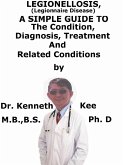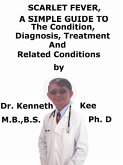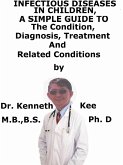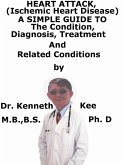This book describes Erythema Infectiosum, Diagnosis and Treatment and Related Diseases Erythema Infectiosum or Fifth disease is a viral disease that often results in a red rash on the arms, legs, and cheeks. Due to blotches of rash on the face and cheeks, it is also known as "slapped cheek disease." It is fairly frequent and mild in most children. It can be more serious for pregnant women or anyone with a compromised immune system. Most doctors advise people with Erythema Infectiosum to wait out the symptoms. This is because there is at present no medicine that will shorten the course of the disease. If the patient has a weakened immune system, the doctor may need to closely assess the patient until the symptoms disappear. Parvovirus B19 is the virus that causes Erythema Infectiosum. It spreads through respiratory secretions, such as saliva, sputum, or nasal mucus, when an infected person coughs or sneezes. The patient is most contagious when it appears like the patient has "just a fever and cold" and before the patient gets the rash or joint pain and swelling. After the patient get the rash the patient is not likely to be contagious, so it is normally safe for the patient or the child to go back to work or school. People with Erythema Infectiosum who have weakened immune systems may be contagious for a longer period of time. Parvovirus B19 can also transmit through blood or blood products. A pregnant woman who is infected with parvovirus B19 can transmit the virus to her baby. Once the patient recovers from Erythema Infectiosum, the patient develops immunity that normally protects the patient from parvovirus B19 infection in the future. Parvovirus B19 is the virus that causes Erythema Infectiosum. This airborne virus is likely to transmit through saliva and respiratory secretions among children who are in elementary school. It is most frequent in: 1. Late winter 2. Spring 3. Early summer It can transmit at any time and among people of any age. Many adults have antibodies that prevent them from developing Erythema Infectiosum due to their previous exposure during childhood. When contracting Erythema Infectiosum as an adult, the symptoms can be serious. If the patient gets Erythema Infectiosum while pregnant, there are serious danger for the unborn baby, including life-threatening anemia. For children with healthy immune systems, Erythema Infectiosum is a frequent, mild illness that rarely manifests lasting after effects. The human parvovirus B19 produces parvovirus infection. This is different from the parvovirus infection that is observed in dogs and cats, so the patient cannot obtain the infection from a pet or vice versa. Human parvovirus infection is most frequent among primary school-age children during episodes in the winter and spring months, but any person can become ill with it at any time. It transmits from person to person, similar to a common cold, often through respiratory secretions and hand-to-hand contact. Parvovirus infection can also transmit through blood. A pregnant woman who is infected can transmit the virus to her baby. The disease is contagious in the week before the rash appears. Once the rash appears, the person with the illness is no longer regarded as infectious and does not need to be isolated. The first symptoms of Erythema Infectiosum are very general. Most people with parvovirus infection do not show any signs or symptoms. Early signs and symptoms of parvovirus infection in children may be: 1. Fever 2. Upset stomach 3. Headache 4. Runny nose 5. Distinctive facial rash In adults the most obvious symptom is joint pain: hand, wrist, knee and ankle...
Dieser Download kann aus rechtlichen Gründen nur mit Rechnungsadresse in A, B, CY, CZ, D, DK, EW, E, FIN, F, GR, H, IRL, I, LT, L, LR, M, NL, PL, P, R, S, SLO, SK ausgeliefert werden.









